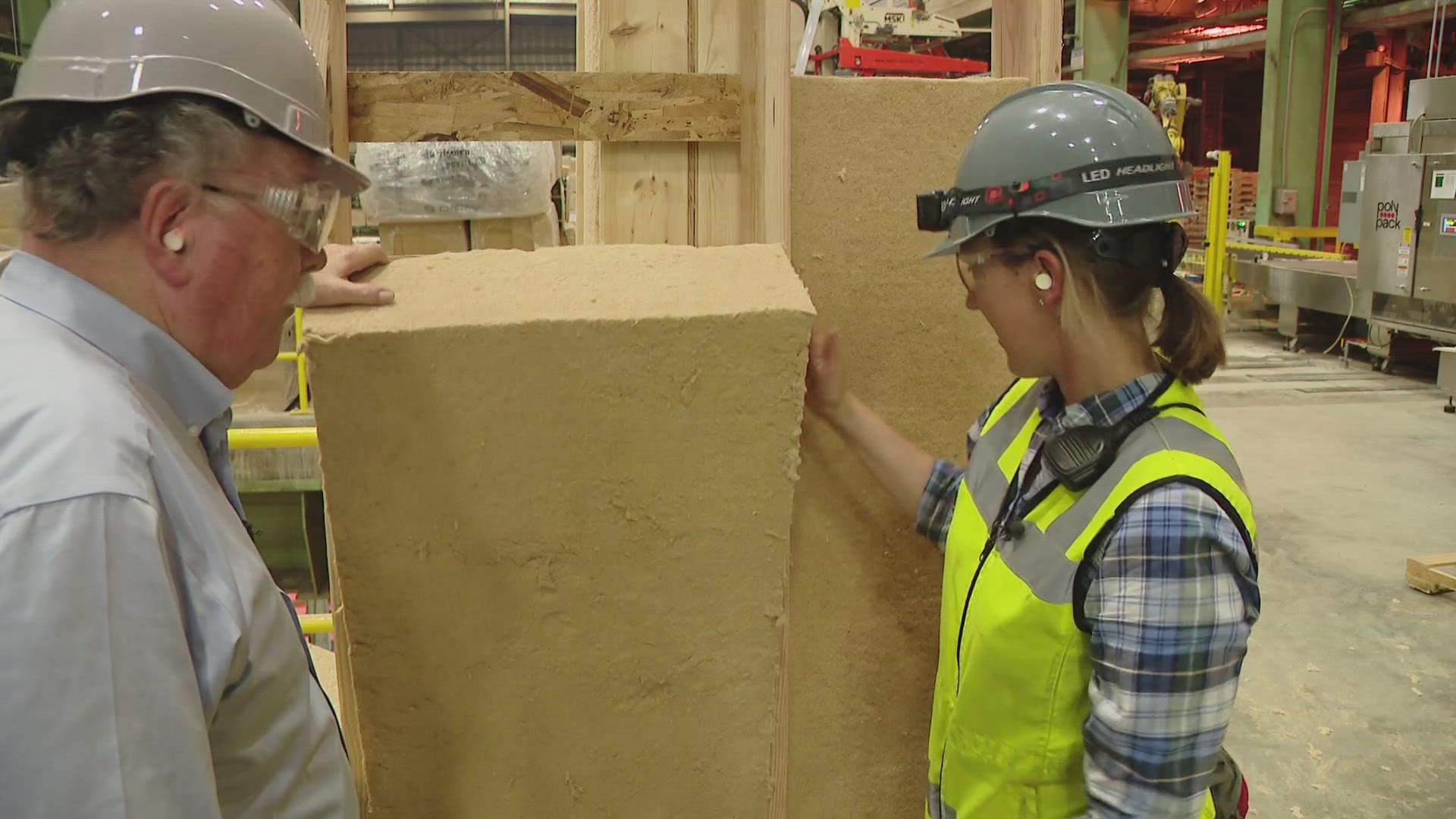MADISON, Maine — The machines are humming again at the old paper mill in Madison. Workers carefully tend them, monitoring the production and quality.
But unlike the days of giant paper machines, there are no harsh chemicals in use, no smell permeating the mill, and seemingly little leftover waste.
And, of course, no huge rolls of paper.
Instead, TimberHP is producing building insulation, made from wood chips.
“I love the product,” Matt O’Malia, one of the co-founders of TimberHP, said.
He and Josh Henry began working on the project eight years ago, looking for what they consider a better way to insulate buildings, with a product that is renewable, recyclable, and what they see as carbon-negative. And one where the raw materials come from Maine and are processed into the finished product here as well.
O’Malia, an architect who specializes in energy-efficient buildings, and Henry, a chemist with strong interest in renewable energy, teamed up to develop a building insulation alternative to foam, fiberglass, and mineral wool—the most commonly used materials.
They found it in Europe, where wood fiber insulation has been manufactured and sold for several decades.
“And it had everything we were looking for,” O’Malia explained. “It was renewable, recyclable, made from the waste stream of the lumber industry … and it was carbon negative, given that it's made from wood with minimal process energy.”
“When we saw this product in Europe, it just immediately made sense," Henry said. “We structure and sheathe our houses in wood. It makes all the sense in the world we would insulate them with wood as well."
They decided shipping the product from Europe to the U.S. in large enough quantities did not make economic sense, so they started research and development on their own, with the help of the University of Maine’s Advanced Structures and Composites Center. Then, say the two partners, they tried to interest U.S. manufacturers in making the product, but found no takers.
So, the architect and the chemist became manufacturers themselves.
With early financial help from Maine economic development agencies, and eventually private investors, they bought the former Madison paper mill, installed new equipment to handle and process the chips, and hired a workforce.
That staff includes a number of people who formerly worked at the paper mill but had moved to other mills or jobs when it finally closed four years earlier.
“Great for the town, great for the community, “ senior engineer and Madison resident Tim Worster, who had worked in the old paper mill for 19 years, said.
Josh Henry, who is CEO of TimberHP, said seeing those workers come back to Madison has been one of the best aspects of the new venture.
“That’s one of the biggest wins, we had a number of our team members worked here 20, 30 years,” he said..
Those workers knew the electrical and other systems still in the mill, which he said was a major help in renovating it to manufacture the new products.
There are currently 14 types or sizes of wood fiber insulation being made at Madison. This includes bags of the fiber made to be blown into wall or ceilings, a technique called “dense-pack” that is typically done with cellulose.
Henry and O’Malia say the wood fiber insulation provides a bit higher R-value and is cost competitive.
The other form of insulation currently in production is made in batts— thick pieces, formed by pressing the fibers together, designed to be fitted into wall cavities inside homes. The founders say TimberHP's batts price is competitive with the fiberglass or mineral wool batts familiar to the market, and are also competitive in terms of price and R-value.
Price, said O’Malia, was a significant factor in the development.
“And that’s something I learned early on, in terms of sustainability and construction, in my work as an architect," he explained. "You can have a great sustainability concept, but if it comes at a high cost premium, only a very few will bother to invest ion it. So, if you really want to move the needle, really have an impact, you have to figure out how to be cost competitive and have the benefit of carbon storage, renewable, recyclable, and just a better material.”
Both men say they have so far seen a lot of interest from builders in the new product and are finding acceptance from the lumber and building materials industry as well.
“Hancock Lumber. Viking Lumber, Ware- Butler, Hammond Lumber,” Henry said, naming the most prominent Maine lumber and building material dealers. “(Companies) throughout the northeast that understand the product have seen it in Europe and are waiting to get it in their hands."
TimberHP says its had strong interest from the large national home builder D.R. Horton, and has just announced a “collaborative partnership” agreement with the large French building material manufacturer Saint-Gobain, owner of the prominent U.S. brand CertainTeed. According to a press release, that agreement will let CertainTeed be one of the U.S. distributors of TimberHP insulation and will have Saint-Gobaine be the exclusive distributor in Canada.
In the press release from the two companies, Josh Henry called the agreement “a huge vote of confidence” in the TimberHP product and their team.
For its part, Saint Gobaine called the deal “a welcome addition to Saint-Gobaine Canada’s light and sustainable construction portfolio.”
TimberHP said it currently employs about 70 people in Madison, but the company has plans to double the mill’s capacity and double the workforce.

